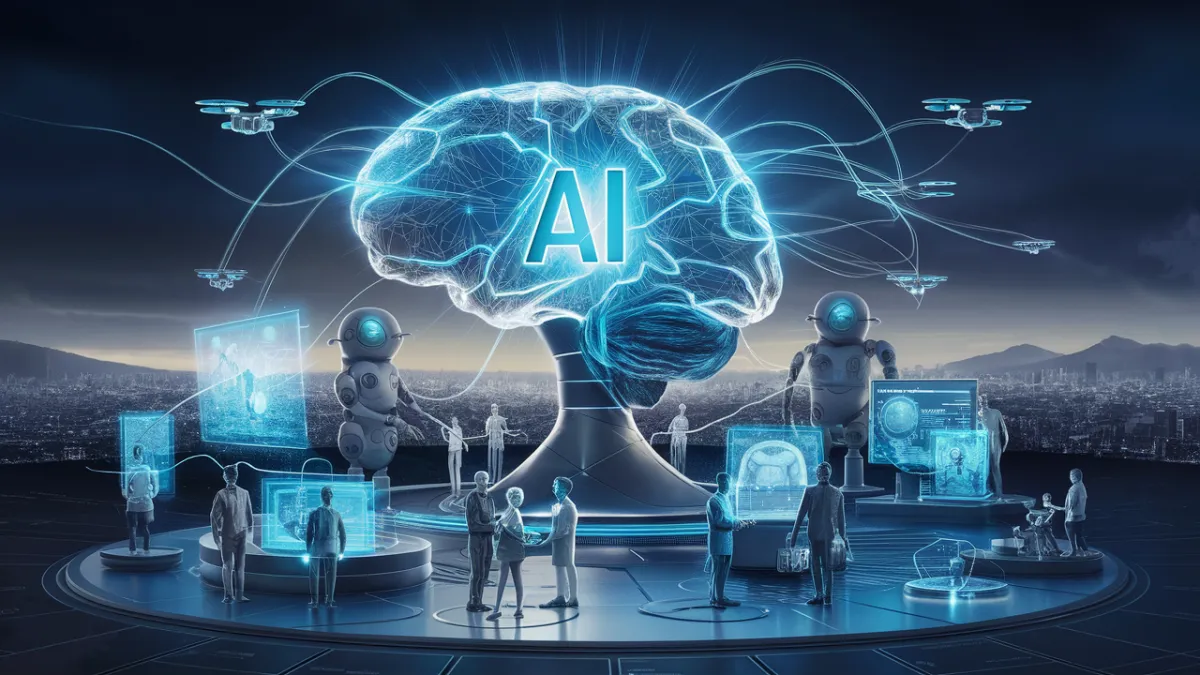
Artificial Intelligence (AI) is no longer a futuristic concept—it is the defining technology of our era, poised to fundamentally restructure global commerce, scientific discovery, and the human workforce. From transforming back-office IT operations to identifying new life-saving drugs, AI is taking on a major, and increasingly autonomous, role in nearly every facet of the future.
The AI-Augmented Workforce: A Partnership, Not a Phase-Out
The most immediate and profound impact of AI is being felt in the labor market. While predictions of mass job loss often dominate headlines, the current reality is one of augmentation and skill transformation.
- Automation of Mundane Tasks: AI, particularly Generative AI, is accelerating the automation of repetitive and data-processing tasks. Roles such as data entry, routine administrative support, and entry-level IT functions are highly susceptible to automation. Some estimates suggest that over a quarter of current work tasks in the US and Europe could be automated by 2030.
- The Rise of AI Fluency: The greatest disruption is creating the greatest opportunity: the demand for AI fluency—the ability to effectively use, manage, and supervise AI tools—has skyrocketed, growing nearly sevenfold in the last two years across US job postings. The future belongs to those who can collaborate with intelligent machines, shifting the focus from execution to orchestration and critical judgment.
- New Value Creation: Rather than simply reducing workloads, AI’s efficiency gains are allowing human workers to concentrate on higher-value activities that require creativity, empathy, complex problem-solving, and critical thinking. Experts predict that AI will unlock trillions of dollars in economic value by 2030, but only if organizations redesign workflows to integrate people, agents, and robots working together.
Scientific Discovery: The Engine of Breakthroughs
In scientific and medical research, Artificial Intelligence is moving beyond being a tool and becoming a discovery engine. Its capacity to analyze vast, multi-modal datasets far exceeds human capability, leading to breakthroughs that were previously unimaginable.
- Drug and Material Discovery: AI tools like Google DeepMind’s GNoME have identified hundreds of thousands of new stable materials at low temperatures, promising advancements in energy storage and superconductors. In drug discovery, AI can analyze genomic data and protein folding structures (like AlphaFold), accelerating the identification of new medicines and personalized treatments, shrinking years-long research timelines into months.
- Healthcare Transformation: AI is revolutionizing clinical care. It is already used for superior image analysis in radiology, helping detect lesions and diagnose diseases with higher accuracy than the human eye. In the future, “living intelligence”—AI-controlled chips implanted in the body—could continuously monitor health, predict patient deterioration in ICUs, and assist surgeons during complex robotic procedures.
- Complex Modeling: AI models like GraphCast are now predicting weather conditions and major events, such as cyclone paths, with greater speed and accuracy than conventional models, providing better early warnings for climate-related disasters.
The Ethical Frontier and The Need for Governance
As Artificial Intelligence becomes ubiquitous, so too do the pressing issues of ethics, governance, and safety. The dependence on massive datasets for training AI models raises acute concerns about data privacy, algorithmic bias, and the transparency of decision-making. Global leaders are increasingly focusing on:
- Data Security: Protecting sensitive information, especially in critical sectors like healthcare, from large-scale data breaches enabled by AI-powered systems.
- Ethical Oversight: Ensuring human supervision, accountability, and the validation of AI algorithms to prevent unintended consequences or the exacerbation of societal biases.
The future role of Artificial Intelligence is not to serve as a simple replacement for human effort, but as a disruptive partner that will redefine intelligence, productivity, and the limits of scientific knowledge. Adapting to this new reality requires an unprecedented global commitment to education, upskilling, and careful regulation to harness AI’s potential while mitigating its risks.
Author Profile

- CEO NGSC Sports
Latest entries
 NBAFebruary 16, 2026The “Mini-Tournament” Experiment: Is the 2026 NBA All-Star Format Built to Last?
NBAFebruary 16, 2026The “Mini-Tournament” Experiment: Is the 2026 NBA All-Star Format Built to Last? NCAABFebruary 14, 2026The Ralph Renaissance: How Shea Ralph Built a Powerhouse in Nashville
NCAABFebruary 14, 2026The Ralph Renaissance: How Shea Ralph Built a Powerhouse in Nashville NCAABFebruary 12, 2026NCAAM Top 25: Down Goes #1 Arizona, Cougars and Red Storm Rise
NCAABFebruary 12, 2026NCAAM Top 25: Down Goes #1 Arizona, Cougars and Red Storm Rise NBAFebruary 11, 2026NBA Recap: Wembanyama has Historic Half and a Madison Square Garden Thriller
NBAFebruary 11, 2026NBA Recap: Wembanyama has Historic Half and a Madison Square Garden Thriller







